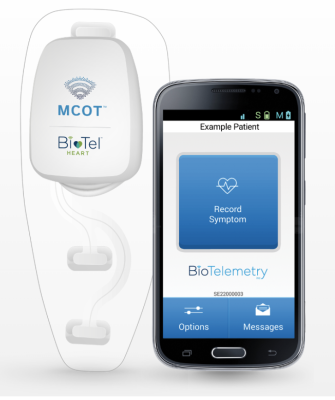
March 13, 2022 – Philips has announced new research evaluating mobile cardiac outpatient telemetry (MCOT) as a first-line diagnostic ambulatory monitoring solution with post-cryptogenic stroke patients. The study determined that a 30-day continuous monitoring program using the Philips BioTel Heart MCOT patch, followed by an implantable loop recorder (ILR), improved atrial fibrillation (AF) detection rates and helped to reduce secondary stroke risk due to new anticoagulant use in subjects with the MCOT patch detected AF. The study also demonstrated that use of initial MCOT monitoring achieved almost eight times lower costs, reducing the total cost per patient with detected atrial fibrillation (AF) by USD 198,9091, compared to monitoring with ILR only. These results strengthen recommendations for prolonged ECG monitoring for this patient population.
Globally, about one in four people over the age of 25 will suffer a stroke in their lifetime2. Nearly a third of Ischemic strokes – the result of blood clots that block the flow of blood to the brain – are classified as cryptogenic, meaning the cause is unknown3. These situations require post-stroke diagnostic work to determine the cause and prevent a second stroke from occurring. AF is a common cause and can increase the risk of stroke by more than five times4, but it often goes undetected since it can be asymptomatic and may occur infrequently.
The study evaluated a stroke population of 1,000 for one year to assess the differences in costs and outcomes of two monitoring options that are available to clinicians today to help improve patient care and improve efficiencies within the healthcare system. Findings revealed using an MCOT patch followed by ILR in half of patients initially undiagnosed with AF leads to an overall cost-of-care savings of more than $4 million. Philips BioTel Heart MCOT detected 4.6 times more patients with AF than ILR alone. And for those with detected AF, the cost per patient was significantly lower when using the MCOT patch followed by ILR ($29,598) than those being monitored with ILR alone ($228,507).
“The diagnostic tools clinicians use to monitor this group of patients play an important role in finding the cause of the stroke and developing a personalized treatment plan,” said Andy Broadway, General Manager of Ambulatory Monitoring and Diagnostics at Philips. “This new research confirms that using Philips BioTel Heart MCOT as the first line of evaluation is more cost-effective and can provide the level of diagnostic confidence needed to help detect and diagnose atrial fibrillation, and potentially prevent a second stroke.”
Patients were monitored for 30 days and were included in one of two monitoring arms in the model: The MCOT patch arm where Philips BioTel Heart MCOT was used followed by ILR in undetected AF patients for 30 days, or the ILR arm where ILR served as the only monitoring tool.
Philips solutions across care pathways
Philips offers a complete portfolio of clinically validated ambulatory cardiac diagnostic and monitoring services as well as stroke care solutions that provide industry-leading data analysis and management to help make care delivery more comprehensive, accurate and efficient.
These solutions aim to connect information, technologies and people across both the stroke and cardiac care pathways, enabling care teams to work quickly and act decisively to provide the best patient treatment. The new research results illustrate the company’s strong commitment to further innovation in this field.
Reference:
[1] Difference in cost per patient with detected AF monitored with ILR ($228,507) minus cost per patient with detected AF patients using the MCOT patch ($29,598). Medic G, Kotsopoulos N, Connolly MP, Lavelle J, Norlock V, Wadhwa M, Mohr BA, Derkac WM. Mobile Cardiac Outpatient Telemetry Patch vs Implantable Loop Recorder in Cryptogenic Stroke Patients in the US - Cost-Minimization Model. Med Devices (Auckl). 2021 Dec 18;14:445-458. doi: 10.2147/MDER.S337142. PMID: 34955658; PMCID: PMC8694406. https://www.ncbi.nlm.nih.gov/pmc/articles/PMC8694406/
[2] Feigin VL, Brainin M, Norrving B, Martins S, Sacco RL, Hacke W, Fisher M, Pandian J, Lindsay P. World Stroke Organization (WSO): Global Stroke Fact Sheet 2022. Int J Stroke. 2022 Jan;17(1):18-29. doi: 10.1177/17474930211065917. PMID: 34986727. https://pubmed.ncbi.nlm.nih.gov/34986727
[3] Finsterer J. Management of cryptogenic stroke. Acta Neurol Belg. 2010 Jun;110(2):135-47. PMID: 20873443. https://pubmed.ncbi.nlm.nih.gov/20873443
[4] Oladiran O, Nwosu I. Stroke risk stratification in atrial fibrillation: a review of common risk factors. J Community Hosp Intern Med Perspect. 2019;9(2):113-120. Published 2019 Apr 12. doi:10.1080/20009666.2019.1593781 https://www.ncbi.nlm.nih.gov/pmc/articles/PMC6484493/


 December 19, 2025
December 19, 2025 









